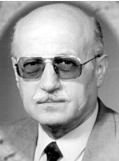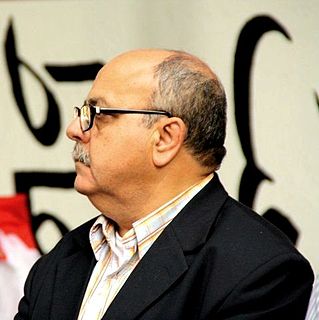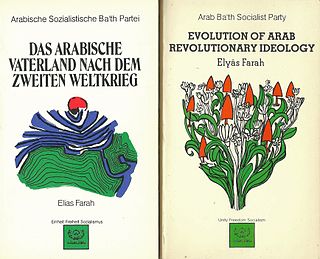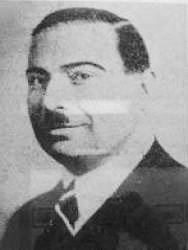 W
WAmmar Abdulhamid is a Syrian-born author, human rights activist, political dissident, co-founder and president of the Tharwa Foundation. Ammar was featured in the Arabic version of Newsweek Magazine as one of 43 people making a difference in the Arab world in May 2005.
 W
WDarin Ahmad is a Syrian artist, poet and writer.
 W
WMary Ajami was a Syrian feminist and pioneering Arabic-language writer who launched one of the first women's magazines in the Arab world called al-'Arus.
 W
WKevork Vartani Ajemian (Adjemian) was a prominent Lebanese-Armenian writer, journalist, novelist, theorist and public activist, and long-time publisher of the Beirut-based literary, artistic and general publication Spurk. Ajemian was a co-founder of the Armenian Secret Army for the Liberation of Armenia (ASALA) military organization.
 W
WKhalaf Ali Alkhalaf ; born 10 November 1969 in Raqqa, is a poet and writer holds Swedish nationality. He lived in Saudi Arabia from 1993 until 2001, then in the same year he moved to Greece and stayed there until the summer of 2002. He went back to Syria and returned to Saudi Arabia again. In the spring of 2008, he left Saudi Arabia, went to Egypt and stayed in Alexandria.
 W
WKhairy Alzahaby خيري الذهبي is a Syrian novelist and thinker, historian and columnist and scenarist born in Damascus 1946.
 W
WTarafa Baghajati is a Syrian-born, Austrian Muslim activist and writer. He is a founding member of the Islamic group "Initiative muslimischer ÖsterreicherInnen" (IMÖ). He has lived in Vienna, Austria since 1986.
 W
WHalim Barakat is an Arab novelist and sociologist. He was born December 4, 1936, into a Greek-Orthodox Arab family in Kafroun, Syria, and raised in Beirut.
 W
WDom Denis Chavis or Dīyūnisūs Shāwīsh was a Syrian priest and monk who flourished in the 1780s. He was a key contributor to the version of the Thousand and One Nights published as Continuation des Mille et Une Nuits in Geneva in 1788–89, which had a lasting influence on conceptions of the contents of the Nights.
 W
WAbdulrazak Eid, Abdul razzak Eid, Abdul razaq Eid, Abdel razzak Eid, Abdul razzaq Eid, or Abd al Razzaq 'Id is a Syrian writer and thinker and one of Syria's leading reformers. He helped to found the Committees of Civil Society in Syria, drafted the Statement of 1000 and helped to draft the Damascus Declaration. Because of his opposition writings and political actions, he was arrested many times in Syria, banned from working and traveling, kidnapped by the Syrian intelligence forces, and was threatened with being assassinated. He fled Syria in 2008 for exile in Europe where he was elected president of the National Council of Damascus Declaration in exile.
 W
WNedaa Elias is a Syrian artist and writer whose works address environmental and cultural concerns pertaining to contemporary Middle Eastern societies. Subjects previously explored by Elias include the discontinuation of the usage of the Arabic script, as well as the effect of bird migration on the gulf’s economy.
 W
WElias Farah (1927–2013), was a Syrian writer and thinker, born in 1927 in the city of Jisr al-Shughur. Upon graduating with a degree in literature from Syrian University, he started his teaching career in Aleppo. Later on, Farah pursued his graduate studies at the University of Geneva in Switzerland where he studied under professor Jean Piaget and earned a doctorate in education and psychology in 1964. He was close to the late Michel Aflaq, the founder of the Baath party.
 W
WFaiz El-Ghusein (1883–1968) was a sheikh from the Hauran, and a former official of the Turkish Government. He is most widely remembered as the author of Martyred Armenia, an alleged eyewitness account of Armenian Genocide.
 W
WMohammad Al-Habash or Mohamed Habash is a Syrian Islamic scholar, writer and politician. He is the principal figure of the Islamic revivalist movement in Syria.
 W
WAbd al-Masih Haddad was a Syrian writer of the Mahjar movement and journalist. His magazine As-Sayeh, started in 1912 and continued until 1957, presented the works of prominent Mahjari literary figures in the United States and became the "spokesman" of the Pen League which he co-founded with Nasib Arida in 1915 or 1916. His collection Hikayat al-Mahjar, which he published in 1921, extended "the scope of the readership of fiction" in modern Arabic literature according to Muhammad Mustafa Badawi.
 W
WQustaki al-Himsi was a Syrian writer and poet of the Nahda movement, a prominent figure in the Arabic literature of the 19th and 20th centuries and one of the first reformers of the traditional Arabic poetry. With his book The researcher's source in the science of criticism, al-Himsi is considered to be the founder of modern literary criticism among the Arab scholars.
 W
WIzzat Husrieh was a renowned Syrian journalist, author, publisher and researcher. He contributed several books to the Arab library and his famous newspaper Al-Alam continued to form public opinion in Syria for two decades.
 W
WMuhammad Sulayman al-Ahmad, better known by his pen name Badawi al-Jabal, was a Syrian poet known for his work in the neo-classical Arabic form. According to anthologist Salma Khadra Jayyusi, Badawi was "one of the greatest poets of the old school".
 W
WMasoud Juni, sometimes spelled as Masoud Jouni, was a Syrian writer, poet and novelist from Mashqita, Latakia known for his sentimental poems about love and nationalism.
 W
W'Abd al-Rahman al-Kawakibi was a Syrian author and Pan-Arab solidarity supporter. He was one of the most prominent intellectuals of his time; however, his thoughts and writings continue to be relevant to the issues of Islamic identity and Pan-Arabism. His criticisms of the Ottoman Empire eventually led to Arabs calling for the sovereignty of the Arab Nations, setting the basis for Pan-Arab nationalism. Al-Kawakibi articulated his ideas in two influential books, Tabai al-Istibdad wa-Masari al-Isti’bad and Umm Al-Qura. He died in 1902 of “mysterious” causes. His family alleged that he was poisoned by Turkish agents.
 W
WKhalil Alrez is a Syrian novelist and translator. He was born in 1956. He has published nine novels and one play and was nominated for the Arabic Booker Prize in April 2020 for his novel The Russian Quarter.
 W
WHanna K. Korany (1871-1898), also seen as Hanna Kurani, was a Syrian writer. From 1893 to 1895 she toured the United States, speaking on women's lives in Syria.
 W
WMuhammad Kurd Ali was a notable Syrian scholar, historian and literary critic in the Arabic language. He was the founder and director of the Academy of the Arabic Language in Damascus (1918) till his death.
 W
WMuhammad al-Maghout was a renowned Syrian writer and poet.
 W
WAbdallah bin Fathallah bin Nasrallah Marrash was a Syrian writer involved in various Arabic-language newspaper ventures in London and Paris.
 W
WFrancis bin Fathallah bin Nasrallah Marrash, also known as Francis al-Marrash or Francis Marrash al-Halabi, was a Syrian scholar, publicist, writer and poet of the Nahda or the Arab Renaissance, and a physician. Most of his works revolve around science, history and religion, analysed under an epistemological light. He traveled throughout Western Asia and France in his youth, and after some medical training and a year of practice in his native Aleppo, during which he wrote several works, he enrolled in a medical school in Paris; yet, declining health and growing blindness forced him to return to Aleppo, where he produced more literary works until his early death.
 W
WMunīr al-Rayyis (1901–1992) was a prominent Syrian newspaper editor and writer.
 W
WMohammed Rateb Al-Nabulsi is a Syrian writer ,Professor, Muslim scholar, Co-founder & manager. He was a professor at Damascus University. He was living in Syria but after the Syrian Revolution started in 2011 he went to Jordan.
 W
WOrwa Nyrabia is an independent Syrian documentary film festival director, producer, filmmaker, trainer, human rights defender and co-founder of DOX BOX International Documentary Film Festival in Syria. Nyrabia is a resident of Berlin, Germany, since the end of 2013 In January 2018 Nyrabia became the director of International Documentary Film Festival Amsterdam (IDFA).
 W
WMansour al-Omari is a Syrian journalist and human rights defender, he contributed to the documentation of human rights violations in Syria with the beginning of the Syrian Uprising. al-Omari was born in the Syrian capital of Damascus in 1979 to a middle-class family, and he was raised in Damascus. al-Omari studied English literature at Damascus University, While a student in college he started his translation and journalism work.
 W
WFathallah Saqqal was a Syrian attorney, writer and government minister. He was well known for successfully arguing for Ibrahim Hananu's innocence in the French Mandatory courts in Syria regarding Hananu's participation in the Hananu Revolt between 1919 and 1921.
 W
WKamal Sido Kurdaxi is a Kurdish interpreter, translator, and author of several publications in Kurdish, Arabic, Russian, German, and Turkish.
 W
WWafa Sultan is a Syrian-American medical doctor, writer, and critic of Islam.
 W
WKhairuddin bin Mahmoud bin Mohammed bin Ali bin Fares al-Zirikli was a Syrian nationalist and poet in opposition to the French Mandate for Syria and the Lebanon, historian, Syrian citizen and a diplomat in the service of Saudi Arabia.